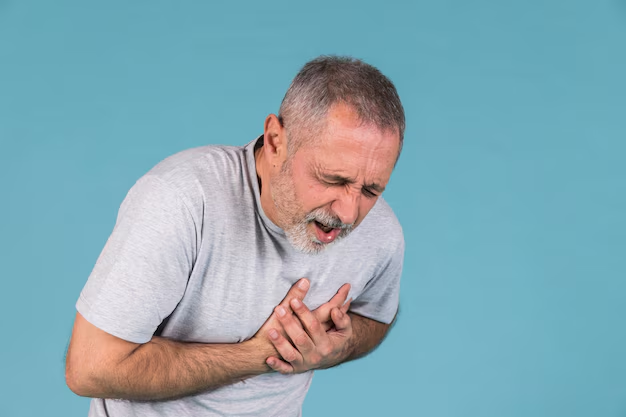Your Guide to Does Hypertension Cause Chest Pain
What You Get:
Free Guide
Free, helpful information about HyperTension FAQ and related Does Hypertension Cause Chest Pain topics.
Helpful Information
Get clear and easy-to-understand details about Does Hypertension Cause Chest Pain topics and resources.
Personalized Offers
Answer a few optional questions to receive offers or information related to HyperTension FAQ. The survey is optional and not required to access your free guide.
Can Hypertension Cause Chest Pain? Here's What You Need to Know
If you've ever felt a pang of concern when experiencing chest pain and wondered if high blood pressure might be the culprit, you're not alone. Hypertension, or high blood pressure, is a silent condition that can have significant implications on heart health, but does it directly cause chest pain? Let's explore this nerve-wracking topic and unravel the truth behind hypertension and its connection to chest discomfort.
Understanding Hypertension and Its Effects
Hypertension is a condition where the force of the blood against your artery walls is consistently too high. Often dubbed the "silent killer," it typically presents no symptoms, which means people might not even be aware they have it until they undergo a regular health check or experience complications.
How Hypertension Affects the Heart
While hypertension itself doesn't cause chest pain directly, it places a huge amount of stress on the heart and arteries. This stress can damage the arterial lining, leading to the formation of plaque and atherosclerosis. Both conditions narrow and harden the arteries, restricting blood flow to the heart, and potentially leading to heart-related problems such as angina or even a heart attack, both of which can cause chest pain.
Why Chest Pain Occurs
When the heart muscle doesn't get enough oxygen-rich blood, it can result in chest pain, medically known as angina. The underlying cause often links back to the coronary heart disease, frequently stemming from untreated or poorly managed hypertension. While chest pain can be indicative of several health issues, severe pressure or squeezing in the chest can be particularly alarming and warrants immediate medical attention.
Take Preventive Measures
Addressing hypertension is a proactive step towards preventing potential heart issues. Here are some measures to keep in check:
- Regular Monitoring: Regularly track your blood pressure numbers, as early detection of elevated levels can prompt timely intervention.
- Healthy Lifestyle Choices: Opt for a diet low in sodium and rich in fruits, vegetables, and whole grains. Engaging in regular physical activity, limiting alcohol intake, and avoiding smoking also greatly contribute to maintaining a healthy heart.
- Medication Compliance: If prescribed, adhering to antihypertensive medications is crucial to keeping blood pressure within target ranges.
When Financial Struggles Meet Health Challenges
Health challenges such as hypertension can undoubtedly place a financial burden on individuals and families. The cost of medication, healthcare visits, dietary changes, and heart-health measurements can add up over time. Thankfully, various financial assistance programs are available to ease this burden.
Exploring avenues for government aid or financial support can offer some relief. Whether obtaining funds for educational purposes, seeking debt relief, or finding credit solutions to manage medical expenses, there are multiple ways to alleviate the financial stress associated with managing your health.
Your Options for Financial Relief
- 🩺 Medicaid: Offers healthcare coverage to eligible low-income adults, children, and the elderly, assisting with hypertension management costs.
- 💊 Prescription Assistance Programs: Many pharmaceutical companies offer discounted or free medications to those without insurance or with limited coverage.
- 🏥 Health Insurance Marketplace: Explore affordable insurance plans that can ensure access to necessary treatments and medications.
- 📚 Educational Grants: For those pursuing studies in healthcare or public health, numerous grants and scholarships can lessen financial strain.
- 📈 Credit Counseling Services: Professional guidance can help manage medical debt and chart a sustainable financial path forward.
Being informed and proactive about both your health and financial well-being is essential. With the right tools and resources at your disposal, managing hypertension and preventing chest pain becomes a more achievable goal, allowing you to lead a healthier, more financially stable life.
What You Get:
Free HyperTension FAQ Guide
Free, helpful information about Does Hypertension Cause Chest Pain and related resources.

Helpful Information
Get clear, easy-to-understand details about Does Hypertension Cause Chest Pain topics.

Optional Personalized Offers
Answer a few optional questions to see offers or information related to HyperTension FAQ. Participation is not required to get your free guide.


Discover More
- a 66 Year Old Female With a History Of Hypertension
- Are Eggs Bad For Hypertension
- Are Eggs Good For Hypertension
- Are Endocrine Disorders Causing Hypertension Rare
- Can Adderall Cause Hypertension
- Can Alcohol Cause Hypertension
- Can Allergies Cause Hypertension
- Can Anemci People Get Hypertension
- Can Anemia Cause Hypertension
- Can Antibiotics Cause Hypertension
